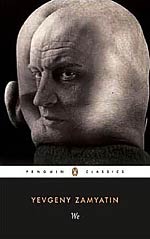
![]() BigEnk
BigEnk
9/15/2025
![]()
A predecessor to dystopian classics 1984 and Brave New World, We is written in the style of a journal, that of of D-503, a spacecraft engineer who lives in the 'United State'. The organization and rules of the 'United State' strictly uphold the superiority of logic, mathematics, and reason, positing that individuality and freedom are roadblocks that prevent humans from reaching unbridled happiness. D-503 lives in a glass house like everyone so that all of his actions can be seen by his neighbors and the state, he follows the mandated 50 repetitions of 'mastication' before swallowing a bite of food, and he fills out 'pink sheets' on other community members for scheduled and detached sex. Yet through all of this D-503 has an awakening of his individuality, or his soul. He begins to see the world as it truly is, and discovers that there are others like him, that another revolution is not only possible but also imminent.
I'm split with my opinion on We. I struggled immensely through the actual prose of it. It's written in a way that heavily resembles the thought process of a confused and damaged mind. Sentences or even entire lines of the thought will end instantaneously, details are obfuscated and nebulous, and the location and timing of events is often unclear. There are certainly moments of clarity that provide perspective. Especially interesting is the final chapter of the book, after D-503 has had the surgery to remove his 'illness'. Everything is in focus and logical, detached from the events that are described. The ending made me rethink my opinion on the writing style, but I still can't quite get past it. It was not the most enjoyable of a reading experience, but looking back on it I'm glad that I pushed through finished the book.
That all being said, I think it's crazy that We isn't more commonly held in the same group of classic dystopian as those previously mentioned, especially since it predates and even heavily influenced them. There is some especially important and unique conversations about the role of revolution in society. Zamyatin, perhaps criticizing the position of the soviet state that was forming around him, argues that, just as there is no highest number, there can be no final revolution. There will always be resistance in any group, and this resistance is vital to the health of society. I also especially enjoyed discussion of self reflection as it relates to the line: "A healthy eye, a finger, a tooth is not felt. Is it not clear then that consciousness of oneself is a sickness?". We spends a lot of time dealing with self discovery and agency as it relates to a government that preaches conformity. D-503's journey is both interesting because of the revolution that buds around him, and his own growth as a person that eventually gets snuffed out by the state. I think that We grows stronger as the story progresses. It also has some dated by brilliant world building that is buttressed by knowing how creative it must've been at it's publication.
We is a flawed work to be sure, but it's also deeply thematic and rich. It deserves it's place as one of the grandfathers of the genre, but stands on it's own merits as well.